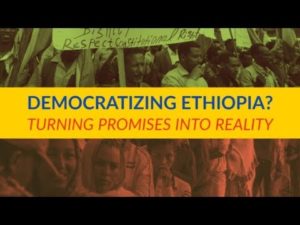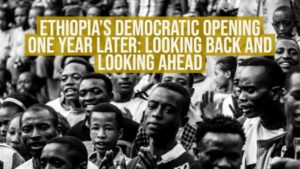 Ethiopian Prime Minister Abiy Ahmed took office amid profound strife, and he won the Nobel Peace Prize just seven months before the country’s elections. The timing isn’t necessarily good. The Nobel Committee’s decision now seems extremely political—and it could aggravate the Ethiopia’s troubles, analyst Bronwyn Bruton argues in Foreign Policy.
Ethiopian Prime Minister Abiy Ahmed took office amid profound strife, and he won the Nobel Peace Prize just seven months before the country’s elections. The timing isn’t necessarily good. The Nobel Committee’s decision now seems extremely political—and it could aggravate the Ethiopia’s troubles, analyst Bronwyn Bruton argues in Foreign Policy.
Ahmed was awarded the Nobel Peace Prize for “his decisive initiative to resolve the border conflict with neighboring Eritrea” and initiating “important reforms that give many citizens hope for a better life and a brighter future,” the Nobel committee said.
One could argue that not since Mikhail Gorbachev — another Nobel Peace Prize laureate — introduced glasnost to the Soviet Union in the mid-1980s has any country embarked on such radical reforms. But a lot more needs to happen before Mr. Abiy can deliver on his pledges, and for ordinary Ethiopians his efforts so far have been a white-knuckle ride, according to Tobias Hagmann, associate professor at Roskilde University in Denmark, and Kjetil Tronvoll, professor of peace and conflict studies at Bjørknes University College, in Norway, and director of Oslo Analytica.
 But Mr. Abiy’s Abyssinian spring has now entered a critical phase, they write for the New York Times:
But Mr. Abiy’s Abyssinian spring has now entered a critical phase, they write for the New York Times:
With the sudden slackening of political controls and the dismantling of some of the state’s authoritarian features under his administration, repressed ethnic, political and religious conflicts have resurfaced across the country. As a result, about 2.9 million people currently are internally displaced, according to the Global Report on Internal Displacement — the largest such figure for any country….The run-up to the 2020 elections will be rife with uncertainty, not only because of entrenched party rivalry and the growing risk of ethnic strife, but also because needed structural reforms — of the judiciary, which remains politicized, and of the election commission — cannot be fully implemented before voting next year.
And without proper democratic institutions and formal checks and balances in place going into the elections, anything can happen, they conclude. RTWT







